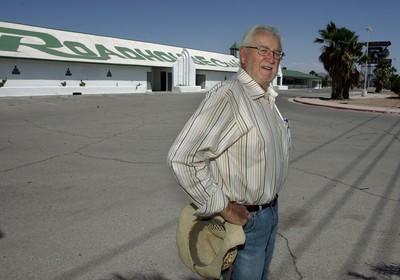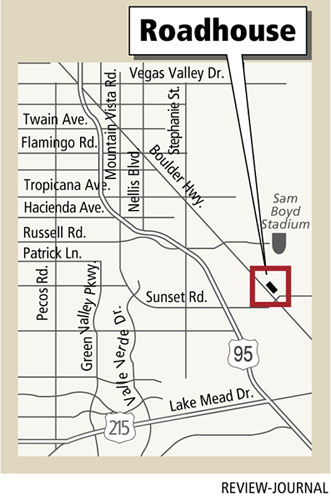Station lobbies against tribe’s plan for casino
A California tribe wants to expand its gaming operations from Indian country into the land of lounge lizards, metropolitan Las Vegas. But Station Casinos has opposed the project through "back channels" at Henderson City Hall.
The Soboba Band of Luiseño Indians, which for more than a decade has operated a casino near Hemet, Calif., is trying to purchase a small, closed casino on Boulder Highway in Henderson. It hopes to reopen the Roadhouse Casino, 2100 N. Boulder Highway, as a tribally owned but conventionally licensed gaming venue.
Henderson's log of lobbying activity shows that a lobbyist for Station Casinos visited city officials at least three times in September 2006 specifically to discuss the Roadhouse project. John Marchiano, the lobbyist, had 31 other contacts with Henderson officials on behalf of Station Casinos between July 5 and Dec. 19 that year, according to lobbyist registration forms. But those 31 forms do not identify the Roadhouse as a "communication item," or topic discussed.
The present owner of the Roadhouse, Robert McMackin, believes the Henderson City Council impeded the sale by caving in to pressure from the locals gaming giant.
"I have reasons to say that," McMackin said.
The Soboba tribe's plan for the Roadhouse would set a new mark for tribal entrepreneurship. The National Indian Gaming Association, a nonprofit trade group located in Washington, D.C., said it's rare for a tribe to choose to run a gambling operation without the business advantages associated with tribal sovereignty.
"They're not going to take a small casino and keep it small. They're going to take it, and make it big," said John Culton, a California real-estate broker who is handling the purchase for the tribe. He is also president of Creekside Holdings, a Nevada corporation that has held a lease and purchase option on the Roadhouse and its 8-acre site.
McMackin claims Station Casinos tried to buy the property from him about a year ago through an inquiry placed with his attorney. The 79-year-old businessman said he rejected the offer as too low. He said Tuesday the escrow for the Sobobas' $15 million purchase is still open, should the deal go through.
The Henderson council voted in December to deny a permit extension that would allow the Roadhouse to operate as a grandfathered neighborhood casino, without a hotel. If that decision stands, a new owner will have to build a hotel to offer gaming again at the Roadhouse, which is on the corner of Boulder Highway at Sunset Road. At that meeting, the tribe was represented by lawyer John O'Reilly, a former chairman of the Nevada Gaming Commission.
After the council vote, Creekside Holdings filed a petition for judicial review. The matter will come up for before recently appointed District Court Judge David Barker on June 19.
"The City's denial was improperly based upon influence from gaming lobbyists and a personal dislike by the City for the record owner ... Robert McMackin," reads Creekside's March 9 court filing.
The city disputes those allegations.
"I think those are very irresponsible and unfair and inflammatory allegations," said Ron Sailon, assistant city attorney for Henderson, who is representing the city in court.
"There is absolutely no basis to argue it was arbitrary for City Council to (deny) a fifth extension," Sailon said.
The council's Dec. 5 vote affirmed a denial by the Henderson Planning Commission, he noted.
Councilman Andy Hafen cast the sole vote in favor of an extension for McMackin. He said Tuesday he thought the Soboba tribe -- which he understood would become the ultimate Roadhouse owner and operator -- had the financial means to buy the property and bring it up to standards, in terms of complying with conditions of the permit extension, including participation in a beautification program for Boulder Highway.
Council members indicated they lacked faith in McMackin, who had received numerous extensions over several years but repeatedly failed to complete the improvements he had promised.
Hafen said Marchiano did approach him on behalf of Station Casinos before the Roadhouse vote, but he felt no pressure.
"People come in all the time expressing opinions on projects," Hafen added.
He said the thrust of Marchiano's remarks was, "We just want you to know, we are concerned about these types of (gambling) operations. We thought Henderson, the city council, was ... looking for a more high-class operation."
Station Casinos spokeswoman Lori Nelson declined comment on the allegation that its lawyers helped steer the Henderson City Council.
Nelson described Marchiano as an outside attorney that Station Casinos hires on occasion as a project consultant. Marchiano is a former Henderson city attorney.
When Barker hears the Roadhouse matter, Sailon said his first task will be to argue for dismissal.
"Creekside is not the party that has a right to bring any of this," he said.
"The Petitioner was not the party who applied for the 2-year extension," reads the city's motion to dismiss. So only McMackin has the right to appeal, the city argues.
McMackin and Creekside are involved in a separate lawsuit on the question of which party breached the Roadhouse lease. But Creekside contends it has status to appeal, in part because it was allowed to participate in a series of November meetings with Henderson city staff -- along with McMackin and the Soboba Indians -- to jointly devise a plan for the Roadhouse to meet conditions for an extension of the special-use permit. After those meetings, city staff recommended an extension but the council voted otherwise.
McMackin thinks the Soboba takeover of the Roadhouse would jump-start other desirable development along Boulder Highway near Sunset.
"It's pretty junky looking, admit it, that intersection."
The California tribe launched its Soboba Casino in 1995. It has table games, 2,000 slot machines and an outdoor concert space that seats 12,000. Tobin White, tribal administrator, did not return several phone calls from the Review-Journal requesting an interview.
The tribe has a track record of acquiring and improving facilities located off its reservation in San Jacinto. It converted a former Scientology school into the Oaks Retreat and Conference Center, Culton said. It also purchased the Country Club at Soboba Springs, a golf course and clubhouse, which it is renovating.
Culton said the tribe may still be interested in the Roadhouse property, even if the hotel requirement is not waived.
The Sobobas are not the first gaming tribe to seek an out-of-state opportunity in commercial gaming. The Mohegan tribe in Connecticut purchased a Pennsylvania race track and turned it into a "racino" by adding slot machines.
Station Casinos has links to tribal gaming out of state. East of Sacramento, Calif., it manages a casino for the United Auburn Indian Community. It has agreements to develop or manage gaming with three other California tribes, and one Michigan tribe, according to Station Casinos' Web site.























